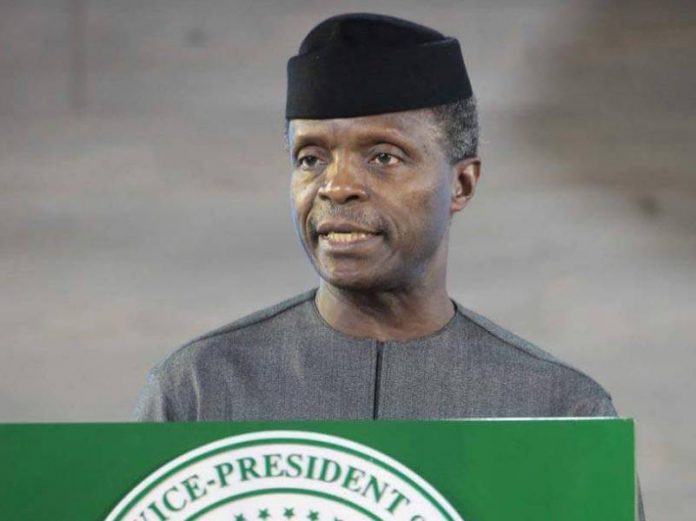Vice President Yemi Osinbajo on Monday declared that Nigeria was an investors’ delight as the Buhari Presidency was making specific efforts to enable the private sector to thrive.
Prof Osinbajo stated this at the Financial Times Africa Summit in London noting that the government of President Muhammadu Buhari, in the past months, had been working assiduously to improve macroeconomic conditions.
A copy of the speech was released to newsmen in Abuja.
According to him the administration specifically carried out extensive ‘ease of doing business’ reforms, in addition to on-going investment in infrastructure.
“After a continuous slide in growth since 2014, the trend of growth in GDP has turned around with a modest growth of 0.55 per cent in the second quarter of this year.
“Inflation, though still somewhat high, has declined from its peak of 18.7 per cent in January 2017 to about 16 per cent today,” he stated.
The Vice President noted that ‘’the outlook going forward is quite positive based on improvements in oil prices and production and the trend of leading indicators such as positive purchasing managers indices, a revived stock exchange and increasing foreign exchange reserves’’.
Highlighting some of the efforts of the administration in agriculture and power, the Vice President drew attention to the significant progress achieved in the ease of doing business initiative.
“In the first stage, reforms were introduced under a 60-day national action plan focused on eight areas that make it easier to register businesses, obtain construction permits, get credit, pay taxes, get electricity, trade across borders, facilitate entry and exit of people and register property.
“Practical examples of success include leveraging the use of technology to fast track business registration and payment of taxes, a functioning, tried and tested 48-hour electronic visa procedure, and an Executive Order mandating greater transparency and efficiency across all government agencies.
“The reforms have led to reduction in cost and time, as well as greater transparency for small and medium sized enterprises in particular.
“Following the 70 per cent success rate achieved in the first phase of the ease of doing business reforms, we recently embarked on a second national action plan which will have 11 areas of focus and will run for 60 days from October 2017,” he added.
According to Osinbajo, Nigeria is an investor’s delight because of the opportunities which the Nigerian economy offers, specifically emphasizing that “the opportunities are enormous indeed.”
He added that the Buhari administration was “nevertheless determined and optimistic that Nigeria will along with the rest of the continent bring about an Africa that works for all its people and contributes to global growth and prosperity.”
The Vice President observed that the theme ‘What Africa Works’, was appropriate and remarked that with Africa’s experience in the past few years, was clear that “what makes Africa work, is what makes economies work anywhere.’’
He named the indices as “honest visionary leadership and good governance, letting the private sector and markets lead, diversification from resource based revenues, developing the potential of the human resources available.”
The Vice President noted that Africa “can demonstrate with clear examples that what makes Africa work are the ingenuity and resilience of the people, especially its 70 per cent youth population, leadership and good governance.’’
He said there was also the initiatives of allowing the private sector and markets to function, focusing on infrastructural development, and the incredible opportunities that abound.”
The summit was also attended by a number of Nigerian dignitaries including Gov. Godwin Obaseki of Edo, the Emir of Kano, Sanusi Lamido Sanusi, the Minister of Information and Culture, Alhaji Lai Mohammed, and Alhaji Aliko Dangote, among others.

